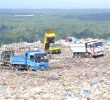Kyoto, Japan�On the eve of the Asian Development Bank�s
(ADB) Annual Meeting in Kyoto, Greenpeace called on the Bank to put its
financial resources and policy capacity fully behind an energy
revolution in Asia based on renewable energy and energy efficiency. Ten
years after the Kyoto Protocol on reducing greenhouse gas emissions was
agreed, another decisive step to protect the climate must be taken in
Kyoto, argued Greenpeace. The recent landmark reports from the
Intergovernmental Panel on Climate Change (IPCC), predict cataclysmic
impacts if the world does not reduce carbon dioxide (CO2) emissions. The
ADB has recognized the dangers of climate change and that it is caused
largely by burning fossil fuels. However, a huge portion of the ADB’s
energy financing is still being channeled towards fossil-fueled energy
across Asia.
Greenpeace�s global energy blueprint, �Energy Revolution� 1 demonstrates
that it is possible to ensure economic development and meet the demand
of scientists to cut global CO2 emissions in half by 2050. Regional
scenarios for China, South Asia and East Asia, show that sustainable
renewable energy and energy efficiency can meet Asia’s rising energy
demand, reduce Asia’s fast rising CO2 emissions and avert further
dangerous climate impacts, which threaten billions in the
world’s most populous continent. Greenpeace has shown that around US$
300 billion a year are needed to fund the required massive increase in
global renewable energy production2. This is about the same amount the
fossil fuel industry currently receives in subsidies. In Asia, US$ 60
billion a year is required to make the energy revolution happen.
The majority of the Asian Development Bank�s funding comes from
industrialized countries such as Japan, the US and the EU. �It is these
countries which have caused an overwhelming part of the climate crisis.
It is their responsibility to fund the sustainable energy revolution we
need,� said Daniel Mittler, Political Advisor to Greenpeace International.
�By the end of this meeting, we expect to see the ADB commit to phasing
out all support for fossil fuels, starting with coal. The ADB must also
increase the US$1 billion it has committed to spend on clean energy
annually by 10 percent each year over the next decade. A significant
step is to make a specific commitment not to fund any fossil fuel
related projects under its so-called clean energy initiatives,� said
Athena Ballesteros, Greenpeace International Asia climate campaigner.
Asia�s rapidly developing economies, in particular China, and the
countries of South Asia and East Asia, stand to suffer most from the
consequences of climate change. The IPCC report further pointed out that
climate change would result in billions of people suffering from water
shortages, famine, the spread of diseases and flooding by the end of
this century. Sea level rise in particular
is predicted to have severe impacts especially on the mega deltas of
Asia such as the Mekong and Zhujiang (Pearl River).
�The ADB must honor Kyoto by agreeing specific steps for fighting
climate change�, Ballesteros concluded.
Notes to Editors:
1. http://www.energyblueprint.info/
2. http://www.energyblueprint.info/447.0.html
For more information:
Athena Ballesteros, Greenpeace International Asia regional climate
campaigner +63 917 8131562
Daniel Mittler, Political Advisor to Greenpeace International +49 171
876 5345
Martin Baker, Greenpeace International communications coordinator (in
Kyoto) mobile +81 80 15097161
****** INBOX is an archive of press releases, statements, announcements, letters to the editors, and manifestos sent to Davao Today for publication. Please email your materials to davaotoday@gmail.com. Davao Today reserves the right to edit or refuse material for publication. *****









